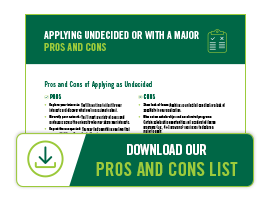Is it Better to Apply as Undecided or With a Major?
By Haley DeLeon | Last Updated: Mar 5, 2025

If you’re struggling to pick a major to mark on your college applications, you’re not alone.
An estimated 20-50 percent of students enter college undecided, and up to 75 percent report having changed their major at least once. After all, not many high school students know exactly what they want to do with the rest of their lives.
However, there are pros and cons to declaring a major or entering college undecided. Here’s what you need to know about applying as an undecided major.
What Is an Undecided Major?
Typically, college applications provide a space where you indicate your first choice of major, and some even provide room for your second and third choices. An undecided major means that you have not yet declared an actual program or degree in which you will focus your studies throughout college. On your college application, this means that you are applying for acceptance as a student to that university without a specific degree of study.
Being an undecided major is temporary — eventually, you must decide on a major that you want to study and change from “undecided” to a major your college or university offers. Typically, you should select a major by the end of your sophomore year so you can start focusing on your program-specific classes in your junior and senior years.
For example, USF allows students to register for up to 36 credit hours before they must declare a major. USF also offers first-year students the Exploratory Curriculum (ECM), which provides students ample time to discover career fields and academic disciplines. During this time, students focus on completing their general education requirements and try out different classes that apply to their core curriculum credits.
Elena Brazee, an environmental biology major at USF, started her college career in the ECM program. “Being ECM gave me access to lots of advisors that helped me interpret personality inventories,” she said. Otherwise, “I would have been forced to choose a major even though I was not 100% about it.”
Will Applying Without a Major Hurt My Chances of Admission?
Applying undecided doesn’t automatically hurt your chances of admission. The impact your choice of major has on your chances of admission depends on the university in question and your application as a whole.
When Does It Make Sense to Apply to College as Undecided?
In some cases, being undecided can be the best choice for your individual circumstances. Here are a few scenarios in which applying as undecided may make the most sense or even be to your advantage.
If You’re a Strong Applicant With Varied Interests
Perhaps you were the star biology student and orchestra concertmaster at your high school, and you don’t want to limit your variety of interests to one area. If you have a high GPA, strong test scores, extensive extracurricular involvement, and excellent application essays, applying undecided will most likely have little impact on your admissions chances.
If Your College Concentration Is Competitive
Suppose you are interested in a traditionally competitive major, such as engineering, and your high school GPA does not reflect your full potential. In that case, it may be advantageous to apply as undecided. This is especially the case if your high school GPA is weak in that major’s core fields. Just make sure you research the opportunities for transferring into this major later in your academic tenure to determine if this is a viable course of action.
If You’re Truly Undecided
The most common reason students apply undecided is that they are genuinely undecided. It is usually not worth choosing a major before thoroughly researching your options.
According to U.S. News & World Report, you should ask yourself the following questions before committing to a major:
- Have you learned enough about different majors and compared them to make an informed decision?
- Do you know what the requirements are for each of your options?
- Have you researched the career options available to students majoring in this field?
If you can’t answer these questions, then applying as undecided may be the best course of action.

When Does it Make Sense to Apply to College as a Declared Major?
There are a few scenarios in which it might make the most sense to declare a major:
If You Know What You’re Interested In
This is the obvious reason to have a declared major as a college applicant. If you’ve had a longstanding interest or specific passion for something, it makes sense for you to choose that as your major. That doesn’t mean you’re stuck with it forever — it just means that you’re interested in that subject enough to pursue further education.
If You’re Seeking Specific Scholarships or Programs
If you’re interested in an accelerated program, such as a 4 + 1 combined bachelor’s/master’s program, then declaring that major may be suitable because it might have additional requirements, such as an essay, to apply.
In addition, having a specific major can help you qualify for scholarships that are limited to certain fields, like STEM. Examine scholarship opportunities in fields you may be interested in to see if this is a potential reason to declare a major in an area where you have a solid academic history.
When the University Requires It
Some universities require that students apply to specific majors, though they may allow them to mark a second or third choice. If you’re not admitted to a competitive program, you can make undecided your second choice and still have a chance of being admitted. Please keep in mind that if you are transferring to another university, you may need to declare a major based on how many credits you are transferring with.
Should I Just Choose a Major?
Short answer, no. Long answer, it depends. Applying undecided may be the best fit in some cases, such as the scenarios listed above. After being exposed to the near-endless number of courses at college, you may change your mind about what you thought you might study. There’s no reason to needlessly restrict yourself if you aren’t already homed in on what interests you, and even that might change regardless of how certain you are.

Pros and Cons of Applying Undecided
One of the benefits of applying undecided is that you’re allowing yourself the time to explore your interests. College is a wonderful, exciting time of discovery that comes with a lot of adjustment. Instead of diving first into a specific field of study, starting college without a major allows you to take courses that may spark your interest. When you start college as an undecided major, you’ll be able to take the entry-level classes required of all students and explore different subject areas that interest you to get a better idea of what your program of study will be.
Another benefit of applying undecided is that you’ll expose yourself to a variety of people in your range of classes, including professors and peers who may help you figure out what you’re interested in. Either way, broadening your network and making new connections is always valuable for college and beyond.
However, a potential con of applying undecided may be a perceived lack of focus and specificity in your college application. In addition, not choosing a course of study may exclude you from certain scholarship opportunities that are only available to students majoring in specific fields.
Pros and Cons of Applying with a Major
Applying with a major demonstrates your interest and passion, which can be valuable at highly selective universities looking to build a balanced incoming freshman class. In addition, it may help you qualify for certain scholarships and other opportunities, as mentioned above.
Declaring a major can also show admissions counselors that you are a serious applicant who is aware of that college’s academic offerings and how they align with your future goals. You can demonstrate your research and commitment to that specific area of study and how it would support your interests and future career in your application.
However, choosing a major you’re not genuinely interested in can make your application disjointed. College admissions officers are interested in authenticity. If your extracurricular activities and academic coursework do not back up your major, it may ring false.
In addition, you might force yourself to choose something pre-emptively and take courses that don’t particularly interest you, causing you to miss out on taking a diverse set of courses to identify your real interests.
Whatever decision you make, it’s comforting to know that you’ll be able to find the right major after exploring different classes and activities during your freshman year of college.
Need a quick reference about applying with and without a major? Download our pros and cons guide to get a quick overview that will help you make the best decision for your situation.


